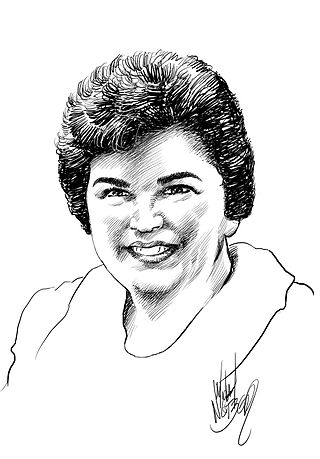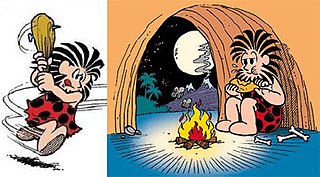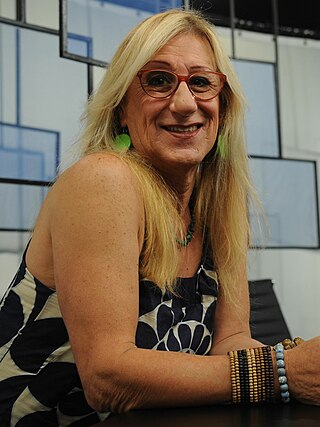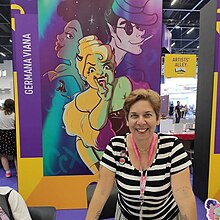Disney comics are comic books and comic strips featuring characters created by the Walt Disney Company, including Mickey Mouse, Donald Duck and Scrooge McDuck.

Marie Severin was an American comics artist and colorist best known for her work for Marvel Comics and the 1950s' EC Comics. She is an inductee of the Will Eisner Comics Hall of Fame and the Harvey Awards Hall of Fame.

Trina Robbins was an American cartoonist. She was an early participant in the underground comix movement, and one of the first women in the movement. She co-produced the 1970 underground comic It Ain't Me, Babe, which was the first comic book entirely created by women. She co-founded the Wimmen's Comix collective, wrote for Wonder Woman, and produced adaptations of Dope and The Silver Metal Lover. She was inducted into the Will Eisner Hall of Fame in 2013 and received Eisner Awards in 2017 and 2021.

Tarzanesque is a term created by Frenchman Francis Lacassin used to describe characters in comic books inspired by Tarzan. A tarzanesque character resembles Tarzan in his physical resourcefulness, within a line of action that includes an adventurous life in the jungle, the gift of understanding and being understood by animals, contact with lost civilizations and courage combined with the ability to deal with nature. The creation of such characters may have been propitiated by the success that Tarzan had achieved since his appearance in literature in 1912, culminating with the release of daily comic strips in 1929, which paved the way for a genre that combined the allure of the unknown environment, the need for the archetypal characteristics of the hero and the popularity of access.

The Cavern Clan (Piteco) is a Brazilian comic strip created in 1961 by Mauricio de Sousa. It is part of the Monica's Gang series.

The Funnies, also known as Bubbly the Astronaut, is a Brazilian comic strip series, created in 1963 and part of the Monica's Gang comic strips. It centers around Bubbly, an astronaut, whose parents and ex-girlfriend Rita appear very rarely, making him the only recurring character. The comic strip can be defined as a science fiction adventure strip.

Laerte Coutinho, known mainly as simply Laerte, is a Brazilian cartoonist and screenwriter, known for creating comic strips such as Piratas do Tietê.

O Menino Maluquinho is a children's media franchise created by the Brazilian writer and cartoonist Ziraldo in the 80s. It started as a children's book published in 1980 which for many years was regarded as a classic of children's literature in Brazil, getting spun off into comics, movies, plays and TV series, as well being known for being Ziraldo's longest running comic book series and the second most popular, after "Turma do Pererê".

André Diniz is a Brazilian comics artist. He began working with comics in 1994 with the fanzine Grandes Enigmas da Humanidade, which had a circulation of 5,000 copies.
Universo HQ is a Brazilian website about comics and considered the most important Brazilian information source on comics-related news.

Bianca Pinheiro is a Brazilian comics artist and illustrator. She graduated from Graphic Arts by UTFPR and did postgraduate studies in Comics by the Grupo Educacional Opet.

Julia Nascimento Bacellar, known as Julia Bax, is a Brazilian comics artist. Her first comic book work was published in the Brazilian magazine Kaos!, recommended by Roger Cruz. After that, she made the drawings of a 12-page story on the album Quebra-Queixo Technorama Volume 2, published by Devir. By these two works, in 2006 Julia won the Troféu HQ Mix, the main Brazilian comic book prize, in the category "Revelation Penciller". She started working for publishers in other countries, especially Marvel Comics, in which she participated in the magazine X-Men: First Class. Julia also has published works for publishers like Boom! Studios, Devil's Due and Le Lombard, among others. Some of her published works are Histórias, Remy and Pink Daïquiri. In 2016, the Belgian publishing house Le Lombard published the graphic novel Princesse Caraboo, based on the true story of the notorious impostor Mary Baker.
Klévisson Viana is a Brazilian cordel literature poet, comics artist and editor. In 1995 he founded the Tupynanquim publishing house, specialized in comics and cordel. He is also a member of the Brazilian Cordel Literature Academy. He started working as illustrator in 1988, at the age of 15, in the newspaper A Voz do Povo, in Canindé. He won the Troféu HQ Mix three times: best national graphic novel in 1999, best adventure and fiction magazine in 2001 and best national special edition in 2004. Viana also won the third place in Prêmio Jabuti in 2014 with the adaptation of The Guarani in cordel.

Lucio Luiz is a Brazilian journalist, writer, editor, podcaster and comics author. He holds a degree in Journalism and has Master's degree and Doctorate in Education.
Miguel Penteado was a Brazilian publisher, printer and comic artist. He started his career working at La Selva publishing house in the 1950s, illustrating horror comic book covers. In 1959, he founded, together with Jayme Cortez, the publishing house Continental with the objective of publishing only Brazilian comics. It was in this publishing house that Mauricio de Sousa debuted in comic books with Bidu. After leaving Outubro due to disagreements with Cortez and other partners, Penteado founded the publishing house GEP, which, among other publications, was responsible for part of the material from Marvel Comics in Brazil from 1969, publishing for the first time in the country characters like the Silver Surfer, the X-Men and Captain Marvel. He gave up working as a publisher in 1972, after having several of his magazines censored by the then Brazilian military dictatorship, retiring in 1980. In 1990, he was awarded with the Prêmio Angelo Agostini for Master of National Comics, an award that aims to honor artists who have dedicated themselves to Brazilian comics for at least 25 years.
Roberto Fukue, sometimes Roberto O. Fukue or Rof, was a Brazilian comic artist of Japanese descent. He started working with comic books at age 16, following his brother Paulo Fukue, who had been hired by the EDREL publishing house. In 1972, Fukue went to editora Abril, again together with his brother, where he worked for many years with Disney comics, drawing characters like José Carioca, Goofy, Mickey, etc. He also worked on the comic books Senninha and Sítio do Pica-Pau Amarelo, among others. In 1995, he was awarded with the Prêmio Angelo Agostini for Master of National Comics, an award that aims to honor artists who have dedicated themselves to Brazilian comics for at least 25 years. In 2009, Fukue was part of the creative team that relaunched the comic book Turma do Arrepio, which was a success in the 1990s.
Flavio Soares is a Brazilian comics artist.
Lillo Parra is a Brazilian theatre director and comics artist.
Bienal de Quadrinhos de Curitiba is a Brazilian comic book festival held since 2011 in Curitiba.











